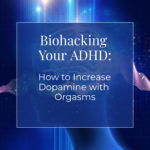
ADHD stands for Attention Deficit Hyperactivity Disorder. The symptoms of ADHD vary from person to person depending on the different type of ADHD they have. Some people with ADHD may only have problems with focus, while others may be hyperactive and impulsive as well. There is no one "right" way to have ADHD, and everyone experiences symptoms differently.
There are three different types of ADHD:
While everyone struggles with these symptoms, people with ADHD experience these symptoms daily and it affects their overall functioning at home, school, work, and in social situations.
Dopamine plays a major role in ADHD because it is responsible for focus, motivation, and pleasure. It is responsible for activating the brain's "Reward System" but that name is not really accurate. At the time of the early research, the studies that were set up to test the role of dopamine all used rewards, meaning something "positive," but in reality the function of dopamine is to pay attention or take action when something is uncertain so that you can repeat the behavior. This is why dopamine is linked to addictions and other non "rewarding" behavior. (Check out my blog post "What is Dopamine?" to learn more about this amazing neurotransmitter)
When someone has ADHD, their dopamine levels are usually low. While the cause of ADHD is still unknown, there seems to be two main theories why dopamine is low: over active dopamine transporters (the transporters use the dopamine quicker than what can be produced) and structural differences in the gray matter of the brain.
The prefrontal cortex of the brain, which is responsible for executive functions such as focus, motivation, and lots of other important social functions, is modulated by dopamine. Regardless of the cause of low levels of dopamine, the way to help people with ADHD is to get control over their dopamine levels.
There are two other neurotransmitters that are tied to dopamine production: norepinephrine and serotonin. Typically, the medications that are prescribed and help people with ADHD either increase dopamine & norepinephrine (Adderall, Vyvanse, etc) or increase serotonin (Wellbutrin, Effexor, and other anxiety or depression medications). All three of these neurotransmitters play an important role in having ADHD symptoms or not.
Having regular orgasms increases the production of these neurotransmitters. From the moment you begin getting aroused, you increase norepinephrine. As you build towards an orgasm, you increase dopamine. After you orgasm, your body ramps up serotonin production.
Another added bonus is that when you orgasm, your brain produces gamma brain waves (so does meditation, but orgasms are much more fun then meditating). Gamma has been known to increase brain gray matter density. As you just learned, the gray matter has a role in dopamine production. The more you can increase your brain gray matter, the better your dopamine levels will be.
Giving yourself a quick orgasm is the quickest way to increase dopamine levels in your body without the use of medication. But quick hits of dopamine from an orgasm aren't enough to sustain increased production levels.
I'm all for grabbing my vibrator and giving myself a quick orgasm to help me get motivated when I'm procrastinating on a task, but that's not always an option. And quick bursts of dopamine don't create sustained dopamine levels.
There needs to be an increase in norepinephrine AND serotonin along with dopamine in order to make lasting effects. If you are using orgasm to alter your neurobiology, then long, sustained sexual encounters are the key. The more time you spend in arousal, the more you "train your brain" to increase norepinephrine and dopamine. Your serotonin production levels after an orgasm are determined based on the amount of dopamine. If you have lower dopamine leading to orgasm, you will produce lower levels of serotonin after orgasm.
But it's more than just the production of dopamine. Remember how gamma waves increase brain matter? Well, self pleasure practices that are based on neurobiology will increase the time you spend in gamma brain waves and Alpha brainwaves.
Alpha brain wave state is when you are focused and alert. Beta brain waves are when your brain is thinking quickly and solving problems, but focus is not a priority. People with ADHD have an imbalanced time spent in Beta brain waves as compared to neurotypical individuals who have a good balance between alpha and beta.
While long, intense rounds of passionate sex are definitely a fun and great way to increase your dopamine levels, not all of us have partners and even those that do have partners don't always having marathon sessions. And besides, your health and well-being should be in your hands, not your lovers.
Developing a self pleasure practice will help you increase your dopamine, norepinephrine, and serotonin levels while simultaneously increase the amount of time you spend in Alpha brain waves. A win for neurotypical people. A win-win for people with ADHD.